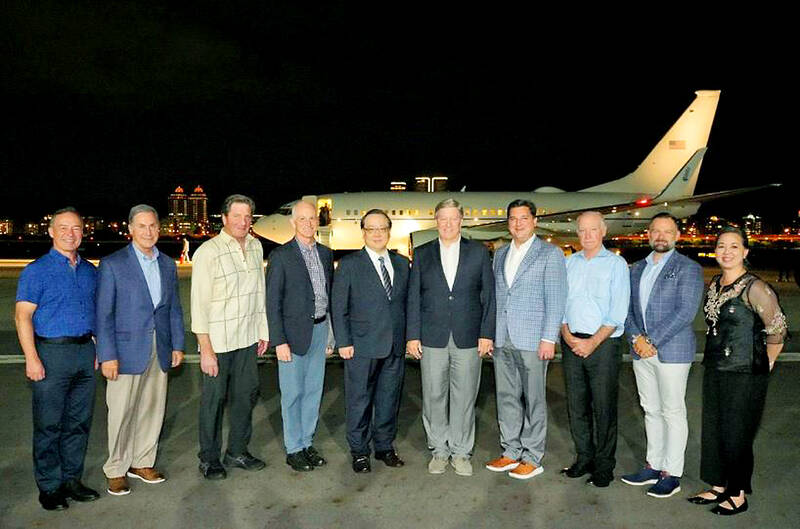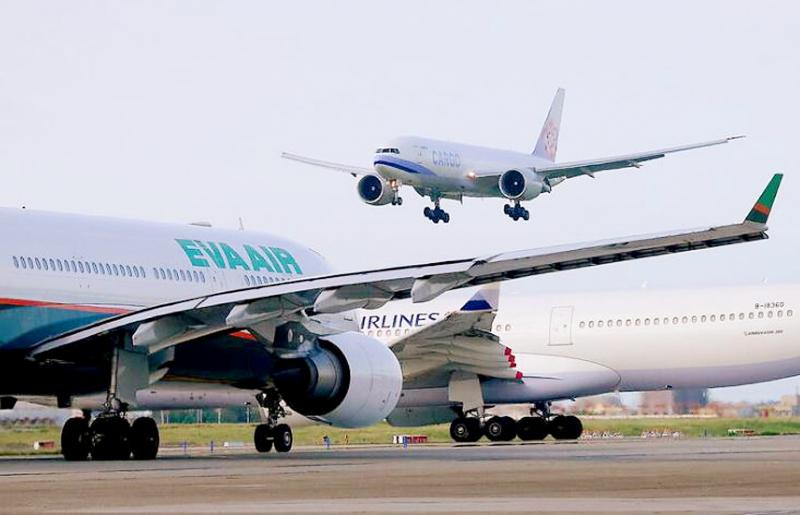The military would for the first time use the nation’s main airport for a simulation of local troops repelling Chinese paratroopers during next month’s Hang Kuang exercises, a defense official said on condition of anonymity yesterday.
The drill, planned for July 26, would mark the first time a counter-airborne assault drill is staged at Taiwan Taoyuan International Airport, the official said.
The army’s special forces would assume the role of aggressor in the exercise, while regular ground forces would act as the defenders, the official said.

Photo courtesy of the Ministry of Foreign Affairs
Flights would be suspended for an hour during the exercise, and the Ministry of National Defense would inform airlines and civil aviation authorities about the details at an appropriate time, the official said.
This year’s Han Kuang military exercises are to take place from July 24 to 28.
The live-fire component of the military exercises next month would also for the first time hold an emergency landing and takeoff drill at a civilian airport in Taitung County, and would involve the use of F-16 jets and C-130H Hercules transport aircraft, a military source said on Saturday.

Photo: Taipei Times
The drill will be staged at Taitung Fengnian Airport, which opened in 1981.
The purpose of the drill is to test Taiwan’s civilian airports and emergency landing strips to make sure they are capable of handling takeoff and landing missions in wartime, the source said.
In other news, the military yesterday reiterated that it would strike Chinese warships and warplanes in defense if they were detected within Taiwan’s 12-nautical-mile (22.2km) territorial space.
The comment came after Chinese warplanes on Saturday were spotted flying close to the airspace under Taipei’s control for the first time in six months.
The ministry said that 19 Chinese warplanes were detected around Taiwan from 6pm on Friday to 6am on Saturday, including an unspecified number of J-10 and J-16 fighters.
Among the 19, eight crossed the median line of the Taiwan Strait and approached the outer boundary of the contiguous zone, which is 24 nautical miles from Taiwan’s shore.
Although the Chinese People’s Liberation Army has frequently sent planes and ships in the vicinity of Taiwan and flown over the median line, it rarely sends them near Taipei’s contiguous zone.
In other news, Mike Rogers, chairman of the US House of Representatives’ Committee on Armed Services, arrived last night in Taiwan for a three-day visit, the Ministry of Foreign Affairs said.
Rogers, a Republican, is leading a bipartisan congressional delegation that includes Democratic US representatives Adam Smith, Joe Courtney, John Garamendi and Jill Tokuda, and Republican US representatives David Rouzer, Gary Palmer, James Moylan and Corry Mills.
President Tsai Ing-wen (蔡英文) extended her welcome to the US legislators and is to receive the delegation this afternoon, Presidential Office spokeswoman Kolas Yotaka said last night.
The Tsai administration hopes that the US lawmakers’ visit will facilitate a deepening of trade and security ties between Taipei and Washington, and contribute to peace and stability in the Indo-Pacific region, she said.

CHAOS: Iranians took to the streets playing celebratory music after reports of Khamenei’s death on Saturday, while mourners also gathered in Tehran yesterday Iranian Supreme Leader Ayatollah Ali Khamenei was killed in a major attack on Iran launched by Israel and the US, throwing the future of the Islamic republic into doubt and raising the risk of regional instability. Iranian state television and the state-run IRNA news agency announced the 86-year-old’s death early yesterday. US President Donald Trump said it gave Iranians their “greatest chance” to “take back” their country. The announcements came after a joint US and Israeli aerial bombardment that targeted Iranian military and governmental sites. Trump said the “heavy and pinpoint bombing” would continue through the week or as long

TRUST: The KMT said it respected the US’ timing and considerations, and hoped it would continue to honor its commitments to helping Taiwan bolster its defenses and deterrence US President Donald Trump is delaying a multibillion-dollar arms sale to Taiwan to ensure his visit to Beijing is successful, a New York Times report said. The weapons sales package has stalled in the US Department of State, the report said, citing US officials it did not identify. The White House has told agencies not to push forward ahead of Trump’s meeting with Chinese President Xi Jinping (習近平), it said. The two last month held a phone call to discuss trade and geopolitical flashpoints ahead of the summit. Xi raised the Taiwan issue and urged the US to handle arms sales to

BIG SPENDERS: Foreign investors bought the most Taiwan equities since 2005, signaling confidence that an AI boom would continue to benefit chipmakers Taiwan Semiconductor Manufacturing Co’s (TSMC, 台積電) market capitalization swelled to US$2 trillion for the first time following a 4.25 percent rally in its American depositary receipts (ADR) overnight, putting the world’s biggest contract chipmaker sixth on the list of the world’s biggest companies by market capitalization, just behind Amazon.com Inc. The site CompaniesMarketcap.com ranked TSMC ahead of Saudi Aramco and Meta Platforms Inc. The Taiwanese company’s ADRs on Tuesday surged to US$385.75 on the New York Stock Exchange, as strong demand for artificial intelligence (AI) applications led to chip supply constraints and boost revenue growth to record-breaking levels. Each TSMC ADR represents

Pro-democracy media tycoon Jimmy Lai’s (黎智英) fraud conviction and prison sentence were yesterday overturned by a Hong Kong court, in a surprise legal decision that comes soon after Lai was jailed for 20 years on a separate national security charge. Judges Jeremy Poon (潘兆初), Anthea Pang (彭寶琴) and Derek Pang (彭偉昌) said in the judgement that they allowed the appeal from Lai, and another defendant in the case, to proceed, as a lower court judge had “erred.” “The Court of Appeal gave them leave to appeal against their conviction, allowed their appeals, quashed the convictions and set aside the sentences,” the judges